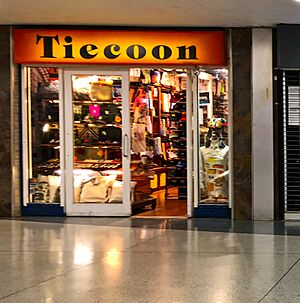Pun facts for kids
A pun is a type of joke that uses words in a clever way. It's like a "play on words" where you use a word that sounds like another word, or a word that has more than one meaning. The goal of a pun is usually to make people laugh! Many jokes you hear are actually puns.
Sometimes, a pun uses a word that sounds the same as another word but has a different meaning or spelling. These are called homophones. Other times, a pun uses a word that has two different meanings, like a regular meaning and a hidden, funny meaning.
Contents
What is a Pun?
Puns often make you think about words in a new way. They can be tricky because you need to understand the different meanings or sounds of words to "get" the joke.
How Puns Work
Puns can work in a few different ways:
- Using words that sound alike: This is when two words sound the same but have different meanings. For example, "I'm reading a book about anti-gravity. It's impossible to put down!" Here, "put down" means both to place the book on a surface and to stop reading it.
- Using words with multiple meanings: Some words have more than one meaning. A pun might use one meaning of a word while hinting at another. For example, if a young man joins the Navy and someone says he "sailed through his exams", it's a pun. "Sailed through" means he did well easily, but it also connects to sailing ships in the Navy.
- Knock-knock jokes: Many knock-knock jokes are puns! Here's an example:
- "Knock-knock!"
- "Who's there?"
- "Dishwasher."
- "Dishwasher Who?"
- "Dishwasher way I ushed to shpeak before I got my falsh teesh."
(This joke plays on how someone with false teeth might say "This was the way I used to speak before I got my false teeth.")
Puns in Everyday Life
You can find puns everywhere! They are in jokes, riddles, and even in the names of shops or products, like the "Tiecoon Tie Shop" in the picture.
There's a famous joke about a person who sent ten different puns to friends, hoping at least one would make them laugh. Sadly, "no pun in ten did." This is a pun itself, playing on the phrase "no pun intended," which people say when they accidentally make a pun.
Puns in Different Languages
Puns are easier to make in some languages than others. Languages that have many homophones (words that sound the same) are great for creating puns. For example, the Chinese language has many homophones, so puns are very common there.
Examples of Puns
Here are a few more examples of puns:
- Imagine a rock band playing on an iceberg. Someone might say their music is really cool! This is a pun because "cool" means both cold and awesome.
- If someone says, "You're fired!" while a person is shot from a cannon, it's a pun. "Fired" means both to be dismissed from a job and to be launched from a cannon.
- A neighbor asks, "How is your vineyard doing?" The woman replies, "It's growing grape!" This is a play on words, as "growing grape" sounds like "going great," and grapes grow in a vineyard.
- If someone is talking about their two boys growing up and eating a lot, and one parent just started a new job, the other might say, "I hope [he/she] starts bringing home the bacon!" This is a pun because "bacon" means both the food and money.
Famous Puns
Many writers and comedians love to use puns. Lewis Carroll, who wrote Alice in Wonderland and Alice through the Looking Glass, used many clever puns in his books. Sometimes, puns can be "bad puns" where a word has to be said a bit strangely to make the joke work, but they can still be funny!
Images for kids
-
A black Jeep with the license plate BAABAAA – a pun on the nursery rhyme "Baa, Baa, Black Sheep".
See also
 In Spanish: Calambur para niños
In Spanish: Calambur para niños




